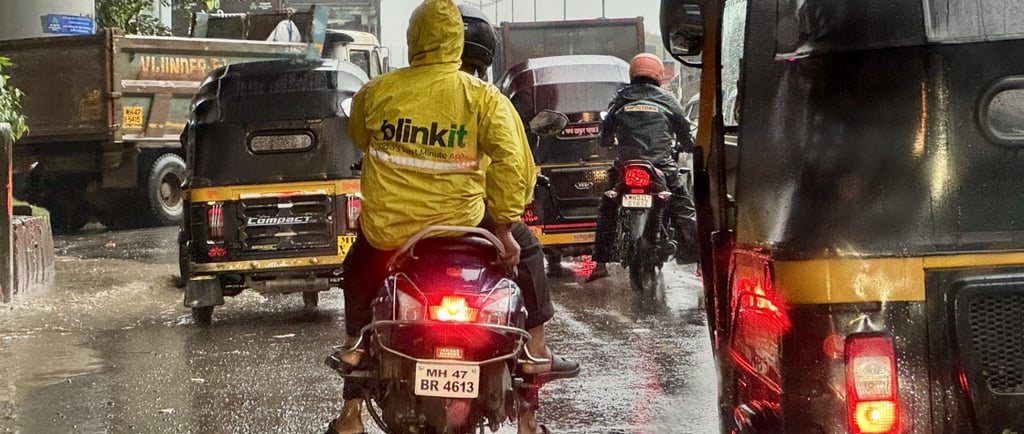
My Adrak: The Story Of Your Delivery Partner
The story offers a slice of life, presenting the daily struggles of a delivery partner. In India, the gig economy provides a flexible and accessible way for many to earn a living. But it raises an important question: are they receiving the respect and recognition they truly deserve for their hustle?
GIG ECONOMYMICRO-NARRATIVEHUMAN INTEREST STORY
Pournamasi Mohapatra
12/18/20243 min read


It’s mid-July in Mumbai, and I’m perched on the edge of my living room sofa, checking the time with the impatience of a 12-year-old. Any minute now, my dad, visiting for the first time since my wedding, will walk through that door.
My phone buzzes with a text from my husband: “Picked up Papa from the airport.” Another buzz. This time, it’s a notification from Zepto. The adrak I ordered is promised in six minutes. Six minutes! It feels more like a marvel comic superpower than a delivery service.
But then again, superpowers aren’t uncommon in this city. Mumbai—where traffic crawls slower than molasses and the rain seems to be in a perpetual relationship with July—is a masterclass in contradictions. People in this city are busy moving mountains while also complaining endlessly about its challenges. My IT job has me stretching across time zones like the rubber band on a mithai box. So, traditional grocery runs? No chance. I’d rather spend my mornings trying to gather enough motivation for yoga class—only to skip it anyway. I warrant those few quiet moments to myself before the madness of the day begins.
The rains, relentless for seven days straight, have turned my balcony into a mini Venice, and my laundry into a soggy reminder of what could’ve been. But work-from-home privileges mean I don’t have to brave the city’s chaos today. I can stay put, brew my adrak wali chai, and wait for my father to arrive—flashing that endearing smile, still half-surprised that his daughter hasn’t burned down the kitchen yet. Thanks to Zepto (and the like) and its gig economy warriors.
Enter Irshad.
My phone chimes again: “Your Zepto delivery partner has entered the society. Press ‘approve’ to allow entry.” A single tap, and the adrak—and let’s not forget the samosas—are on their way up. Eight minutes, not six, but hey, it’s pouring outside, and I’m feeling generous.
Three minutes pass. No sign of Irshad. I call him. Twice. He finally picks up, breathless but polite, “One minute, ma’am, I’m coming up!” I catch the sound of a commotion in the background but brush it off. Delivery dramas on my building’s ground floor are just part of the daily script.
The doorbell rings, and there stands Irshad, drenched but smiling, holding my precious cargo. Behind him, however, looms my society’s watchman, face scrunched like a sour lemon.
“Madam,” the watchman barks, “this rascal entered the society without signing in. He does this every day! He must go down and follow the procedure before delivering anything!”
Irshad, barely 19, pleads earnestly, “Ma’am, please accept the order. The samosas will get cold. I have two more deliveries in Marol and Hiranandani within the next half hour.”
The watchman, now in full judicial mode, counters, “Do not accept this until he goes back down and signs in!”
I’m torn. On one hand, there’s protocol. On the other, there’s Irshad—who just climbed seven flights of stairs because the lift isn’t working, all to ensure my samosas stay crispy. My chai, after all, deserves a worthy companion.
“I’ll take the order,” I declare, handing Irshad a 20-rupee tip as a small gesture for his Herculean effort. His smile lights up brighter than the rare sunshine in Mumbai monsoons, and he dashes off, skipping the elevator (not an option) and flying down the stairs again.
As I crush the adrak for my tea, I think about Irshad’s hard work and strength of character. A red alert might mean an excuse for me to stay home and still get paid, but it doesn’t apply to him. He’s out there everyday, rain or shine, climbing stairs and dodging grumpy watchmen, all to make some decent money while also ensuring our last-minute grocery orders arrive on time.
Here’s hoping he makes it to Marol and Hiranandani on time, earns a few more smiles, and maybe even a great tip. As for the watchman? Well, maybe a good cup of chai will smooth out those frown lines and brighten his day.